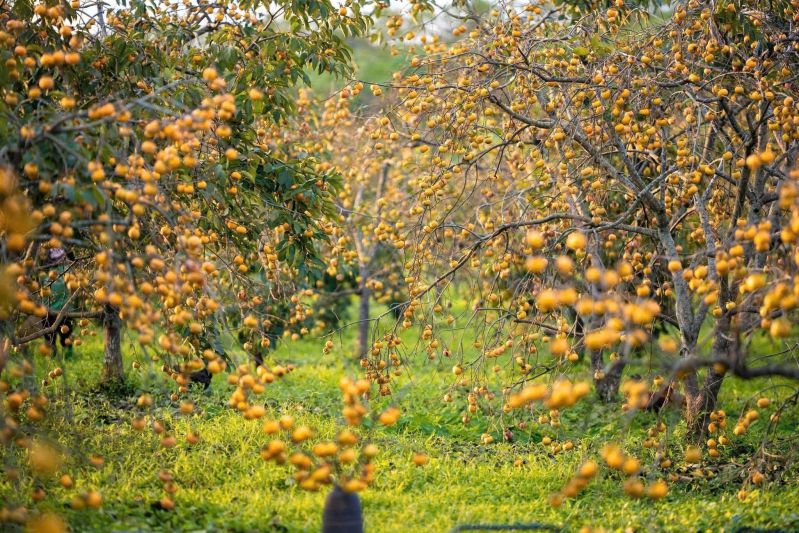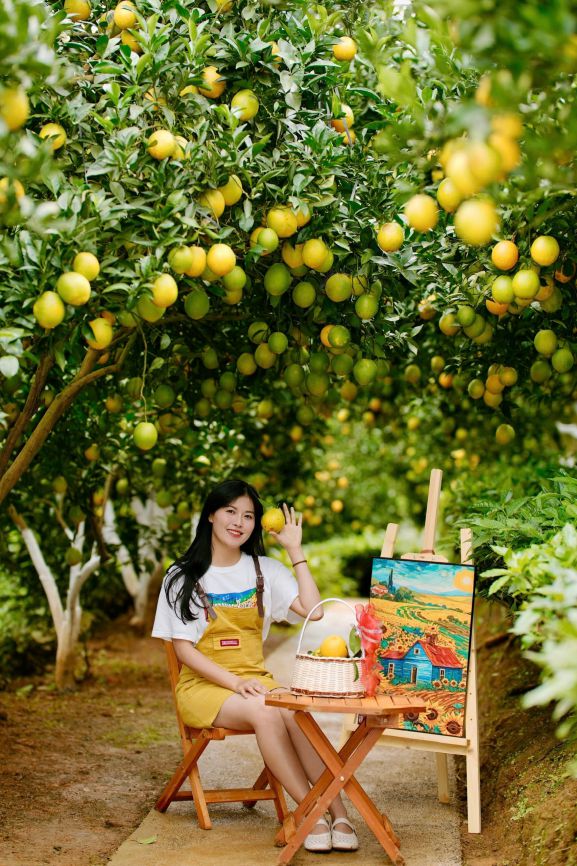Not as brilliant as the spring of plum blossoms and peach blossoms, nor as vibrant as the summer - the season of fruit festivals. Autumn on Moc Chau plateau brings a quiet beauty, but contains a new vitality from the harmony between agriculture and experiential tourism.
million-view check-in points
These days, the whole Thao Nguyen ward - the place considered the "heart" of Moc Chau is filled with the golden color of ripe pink. Along the small roads, each rose garden is fruit-laden, bright in the autumn sunlight. But the special thing is that those rose gardens are no longer simply places for production and cultivation, but have become attractive agricultural tourism destinations. Each season attracts thousands of visitors to experience, take photos, and enjoy fresh roses right in the garden.
At Lan Duong rose garden (Cho Long residential group, Thao Nguyen ward), Ms. Nguyen Thi Lan, the owner of the rose garden, shared: "A few years ago, my family only grew roses to sell their fruits. Since opening to visitors, income has increased significantly. On peak days, more than 600 visitors come to take photos, buy products, and experience picking roses in the garden".
To create a beautiful space for tourists, pink growing households have pruning leaves, keeping fruit, investing in miniatures, building stone walkways, and opening services for renting ethnic costumes. The entrance fee is only 20,000 - 40,000 VND/trip, but it brings great value: Promoting the Moc Chau pink brand while helping people increase their income and reduce dependence on traders.

Leaving the rose gardens, we visited So Lon village, Chieng Son commune, where there is a "A garden" coffee shop designed in the middle of a flower valley. Taking advantage of the airy terrain and cool climate, the restaurant owner has combined planting seasonal flowers, creating a natural landscape for visitors to enjoy coffee and the agricultural scent of the highlands.
The space here is not noisy but gentle, poetic. The painted fences, the small paths are covered with stones, the corners in the middle of the flower garden, all make visitors feel like they are lost in a miniature European farm.
Ms. Quan Phuong Nhung, a tourist from Phu Tho, shared: "Here, I can both sip a cup of coffee and enjoy the scenery. Coming to Moc Chau for a few days, I have learned how to slow down, just need to breathe a full breath of fresh air and feel full of energy".
The next stop on the journey is Na Lun pink grass hill (Moc Chau ward), this place is known as "Da Lat of the Northwest". The slender pink grass, lightly dyed, spreads all over the hillside. Under the early morning sunlight, each cluster of grass shines like pink fog, captivating many tourists and photographers.
But behind that beauty is the cooperation of local people, who have preserved and propagated pink grass to create natural landscapes, combined with ecotourism. They do not break hills to plant short-term trees, but keep grass - keep the soul of the land, of the mountain.
Amidst the immense space, Ms. Trinh Van Anh, a tourist from Dak Lak, shared: "Standing in the middle of a grass hill, I feel a rare peace. It felt like being embraced by nature. I will definitely return to Moc Chau every fall".
When agriculture opens the way for green tourism
Not only roses or flowers, many households in Van Son ward are busy taking care of orange gardens in the ripe season. Cooperatives have combined sightseeing - experience - on-site product consumption, turning orange gardens into "green classrooms" for tourists and students to learn about clean agriculture.

Garden owners and farm owners have gone beyond the image of pure farmers. They are both sustainable farmers and "guides" of the land they are attached to. Each cup of tea, each ripe fruit they bring to invite guests contains pride in their efforts and love for nature. Thanks to that, visitors come here not only to visit, but also to slow down, listen and understand a land that is changing day by day.
According to Ms. Nguyen Thi Hoa - Chairman of Moc Chau Ward People's Committee, the tourism direction associated with experiential agriculture is being encouraged to expand. The government continues to accompany models through support activities, training in community tourism skills, investment in transport infrastructure, promotion of agricultural products and OCOP products; towards the goal of sustainable development, not exchanging the environment for growth.
In the clear weather of the highland autumn, the laughter of tourists still resounds in the sweet and ripe gardens. Moc Chau Plateau is gradually writing a new story - the story of a land that knows how to do tourism from its homeland's garden fields.











